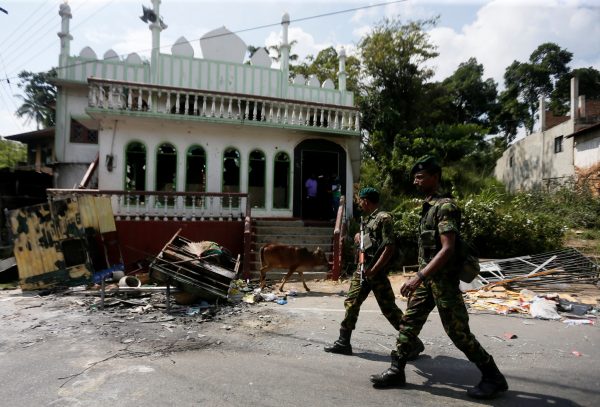Sri Lanka has come under international scrutiny for religious intolerance. Attacks on Christian churches have been going on for the past two decades at least. Most of these attacks have been against new churches that are active in attempting religious conversion. But these conversions take place at the local level in relatively poor areas and as such do not receive much media publicity.
The attacks on Muslims, on the other hand, receive considerably more media attention. This is on account of the higher visibility of mosques and commercial Muslim establishments located mainly in more densely populated urban areas.
The week-long wave of anti-Muslim violence that took place in Kandy in March 2018 came as a wake-up call to those who thought that inter-community tensions no longer lay beneath the surface of Sri Lankan society. In a manner reminiscent of the prelude to the war against the Tamil rebel movement, anti-Muslim sentiment is today being promoted among the Sinhalese ethnic majority who see the Muslim minority as a threat to their own security. The anti-Muslim propaganda focusses on the growth of the Muslim population and its expansion into areas inhabited primarily by members of other communities. Those who foment violence against the Muslim community are citing unfounded allegations of introducing birth control and other drugs into food packets.
Hate speech targeting Muslims has become especially prominent since the end of the war in 2009. There was a serious anti-Muslim riot in the town of Aluthgama in 2014 that claimed four lives. At the core of this trend is a tragic feature of Sri Lankan history: Sinhalese fears being exploited by politicians eager to win the votes of the ethnic majority.
The newly formed Sri Lanka People’s Front — the party that trounced the government parties led by President Maithripala Sirisena and Prime Minister Ranil Wickremesinghe at the recent local government elections — made fear of division of the country and the danger of ‘foreign’ forces main planks of their election campaign. While former president Mahinda Rajapaksa appealed for calm after the recent anti-Muslim violence, he simultaneously used the opportunity to blame the government for seeking to divide the country through constitutional reform. While appealing for peace, Rajapaksa was also rousing nationalist fears.
The nation-wide state of emergency declared on 6 March was criticised as an overreaction to the problem of anti-Muslim violence, as the violence was largely confined to the Kandy district and did not cross over to the rest of the country. But for the Muslim population, the declaration of a country-wide emergency was reassuring.
Mobs involved in the recent violence showed scant respect for the police even in the face of the declaration of a curfew, proving that these actions were organised and premeditated. They were not afraid because they felt they had political protection — the perpetrators had confidence that they were engaging in actions that upheld national interests as dictated by political leaders.
The declaration of emergency was coupled with a restriction on social media, which was being used to spread false messages and inflame hatred. These restrictive measures were a means of protecting a vulnerable minority for a temporary period.
Recent events in Sri Lanka have clearly tested the current government. The government continues to abide by the fundamental principles for which is was voted in by the public: the promotion of democracy, standing against racism and the protection of minority rights.
In previous periods of crisis, governments have resorted to rule by emergency regulation to concentrate power for use against democratic opposition parties. But in this instance, the government announced that it would be a temporary measure and would not last beyond the period of anti-Muslim violence in response to which it was invoked.
But the government has shown its inability to make good use of the democratic space it opened up in Sri Lanka’s political culture to sufficiently and powerfully carry its message to the people. Instead, it has conceded the vast majority of this space to racist and nationalist groups that have used this platform to spread negative messages among the general population.
Tension fuelled by politics continues to build in Sri Lanka. This has to be undone by enlightened leaders of government. In the long term there is a need for trust building and community awareness programs. The government has a duty to reassure the Muslim population that they are equally deserving of the protection of the state and will receive it.
Civil society has its own role to play by educating people. Having only just come out of a 30-year civil war, Sri Lankans may now be pushed into a new one unless there is concerted effort from government and civil society to promote inter-community interaction and understanding. The wounds and traumas of three decades of violence and war have still not healed. This is the message from the violence in Kandy that the government and civil society must emphasise more powerfully to the people.
Jehan Perera is the Executive Director of the National Peace Council of Sri Lanka.

